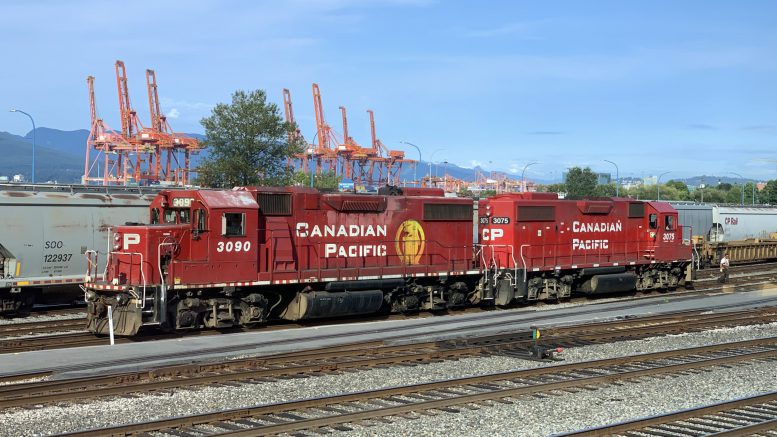Ottawa has stepped in to end a rare strike halting both of Canada’s major railways less than a day after it began.
Labour Minister Steve MacKinnon on Thursday afternoon ordered Canadian Pacific Kansas City Railway (TSX: CP; NYSE: CP), Canadian National Railway (TSX: CNR; NYSE: CNI) and the labour union, the Teamsters Canada Rail Conference, into final arbitration. The companies had locked out about 10,000 employees after the parties failed to reach an agreement.
Mining leaders were among scores of industries concerned the stoppage would affect supply lines across the country and over the border with the United States.
Mining products account for more than half of Canada’s rail-freight volume, with over 160 million tonnes of crude and processed minerals transported in 2022. The sector typically generates over $6 billion annually in rail freight expenditures. The Mining Association of Canada (MAC) and the Saskatchewan Mining Association (SMA) expressed deep concern over the first-ever simultaneous rail disruption.
“As the single largest industrial customer group of Canada’s railways, the mining sector has seen first-hand how detrimental unpredictable work stoppages are to Canada’s reputation as a reliable trading partner,” Pierre Gratton, MAC’s president and CEO, said in a statement before the labour minister acted.
Fertilizer impact
Nutrien (TSX: NTR; NYSE: NTR), one of the world’s largest potash producers, expressed its frustration with the labour dispute in a statement before the arbitration order.
“We are disappointed that the parties involved in this dispute have failed to prevent what has become another significant disruption to vital supply chains serving the agricultural industry,” Nutrien’s chief commercial officer, Mark Thompson, said by email to The Northern Miner. The company relies on Canadian rail to deliver essential crop inputs globally, directly impacting global food security.
German-owned K+S Potash Canada, which operates the Bethune mine in Saskatchewan, said it was prepared to maintain operations. “If required, slight adjustments can be made; however, a prolonged work stoppage will have potentially significant impacts to our operation and production,” spokesperson Sydney Gossard said in an email to The Northern Miner.
Landlocked Saskatchewan’s mining industry relies heavily on rail service to export products like potash. The province’s potash, valued at $10.9 billion in 2023, represents about a third of the world’s supply, according to the SMA.
“Rail is the only way to transport bulk tonnage product to export markets,” Pam Schwann, SMA president, said in a statement. “Even a few days of stopped or delayed services takes the system weeks to recover, with a cost in the billions of dollars.”
Schwann warned that prolonged disruptions could further erode Canada’s market share to global competitors like Belarus and Russia, particularly in potash, where Canada has already experienced setbacks due to previous strikes.
Other routes
Vancouver-based Teck Resources (TSX: TECK.B) said it sought alternative transportation methods to ease the disruption.
“The interruption of rail service is negative for our partners and customers in the critical minerals supply chain,” Teck spokesperson Maclean Kay said in a statement to The Northern Miner. “We encourage all parties and government to resolve this dispute before there are further negative impacts.”
Canada’s largest uranium miner, Cameco (TSX: CCO; NYSE: CCJ), said by email it was concerned about the railed supply of anhydrous hydrogen fluoride to its Port Hope Conversion Facility in Ontario.
Miles apart
Both rail companies had cited union demands as obstacles. CN proposed improved wages and predictable schedules, while CPKC underlined its commitment to fair arbitration.
Teamsters president Paul Boucher alleged that CN and CPKC were willing to compromise rail safety and “tear families apart to earn an extra buck.”
“The railroads don’t care about farmers, small businesses, supply chains, or their own employees,” he said in a release. “Their sole focus is boosting their bottom line, even if it means jeopardizing the entire economy.”
Canada frequently sees rail disruptions. The 2023 West Coast Ports strike, the pandemic and civil disruption in the form of random and sporadic rail blockades have damaged Canada’s reputation as a reliable trading partner, the MAC contends.
“Canada can and must do better at creating a stable and predictable logistics supply chain that restores greater confidence in Canada’s reliability as a trading partner,” Gratton said. “Government should make every effort and use every tool at their disposal to address this unprecedented disruption.
“Failure to do so is an abdication of leadership and an abandonment of responsibility.”


Be the first to comment on "Feds end Canada’s rail strike"